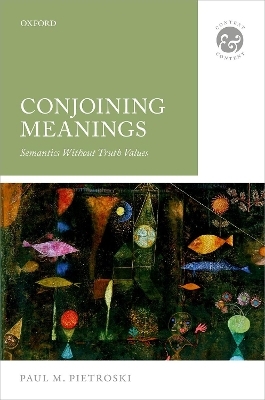
Conjoining Meanings
Oxford University Press (Verlag)
978-0-19-881272-2 (ISBN)
Humans naturally acquire languages that connect meanings with pronunciations. Paul M. Pietroski presents an account of these distinctive languages as generative procedures that respect substantive constraints. Children acquire meaningful lexical items that can be combined, in certain ways, to form meaningful complex expressions. This raises questions about what meanings are, how they can be combined, and what kinds of meanings lexical items can have. According to Pietroski, meanings are neither concepts nor extensions, and sentences do not have truth conditions. He argues that meanings are composable instructions for how to access and assemble concepts of a special sort. More specifically, phrasal meanings are instructions for how to build monadic concepts (a.k.a. mental predicates) that are massively conjunctive, while lexical meanings are instructions for how to fetch concepts that are monadic or dyadic. This allows for polysemy, since a lexical item can be linked to an address that is shared by a family of fetchable concepts. But the posited combinatorial operations are limited and limiting. They impose severe restrictions on which concepts can be fetched for purposes of semantic composition. Correspondingly, Pietroski argues that in lexicalization, available representations are often used to introduce concepts that can be combined via the relevant operations.
Paul M. Pietroski (Ph.D. MIT) is Distinguished Professor of Philosophy and Cognitive Science at Rutgers University. He taught previously at McGill University and the University of Maryland. His research addresses questions concerning linguistic meaning and its relation to cognition: what are word meanings; how are they related to human concepts and our capacity to understand complex expressions; and how do children acquire this remarkable capacity? He is the author of Causing Actions, Events and Semantic Architecture, and numerous articles on topics that span philosophy, linguistics, and psychology. He has held visiting positions at Harvard and the École Normale Supérieure.
0: Overture
1: Locating Meanings
2: Introducing Concepts
3: Invention and Satisfaction
4: Truth or Understanding
5: Events and Framing
6: Massively Monadic, Potentially Plural
7: Minimal Semantic Instructions
8: Reprise
| Erscheinungsdatum | 03.05.2018 |
|---|---|
| Reihe/Serie | Context & Content |
| Verlagsort | Oxford |
| Sprache | englisch |
| Maße | 164 x 242 mm |
| Gewicht | 764 g |
| Themenwelt | Geisteswissenschaften ► Philosophie ► Sprachphilosophie |
| Geisteswissenschaften ► Sprach- / Literaturwissenschaft ► Sprachwissenschaft | |
| ISBN-10 | 0-19-881272-8 / 0198812728 |
| ISBN-13 | 978-0-19-881272-2 / 9780198812722 |
| Zustand | Neuware |
| Haben Sie eine Frage zum Produkt? |
aus dem Bereich


